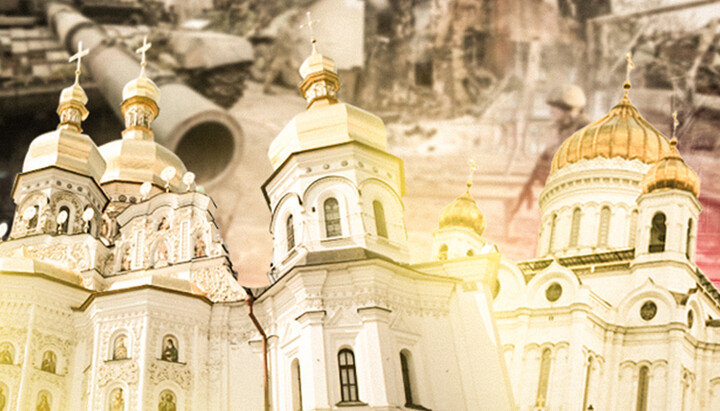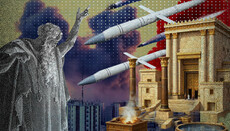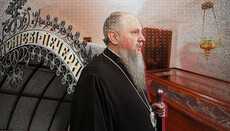Can the Church live without serving the state?

What is most important for a Christian? Can the Church exist without the state? Should Ukrainians pray for Putin? Several questions from UOC believers to Russians.
On October 8, 2023, in Ukraine, Russia and other countries, celebrations were held in memory of St. Sergius of Radonezh. St. Sergius, the great saint, wonder-worker, hesychast, and founder of monasticism in Rus, is revered far beyond his homeland. His name is even included in the liturgical calendar of the Roman Catholic Church. Why? Undoubtedly, it's for the depth of his spiritual life and feats.
However, in Russian publications today, St. Sergius is depicted somewhat differently – as a "statesman", whose main purpose in life was blessing Dmitry Donskoy for the battle against Mamai and the unification of Russian lands. There is also a strong emphasis on the military feat of his monks – Peresvet and Oslyabya. For example, Bishop Pitirim (Tvorogov) states that if it weren't for Sergius's blessing if it weren't for the victory over the Tatars, Russia would now be "not the Third Rome" but "one of the Islamic states of Central Asia".
The overall tone of the current celebrations of the saint is "militaristic". The idea is that if the great saint of Russia blessed people for war in the 14th century, then it is quite appropriate and permissible today.
A popular Russian Telegram channel, "Presidential Advisor", published a sermon by Patriarch Kirill about St. Sergius with a sarcastic comment, "dedicated to all 'Tolstoyans' in the Church."
In the Russian Orthodox Church today, "Tolstoyans" is a derogatory term used for those who advocate for peace. The hint from the channel's authors is clear: the head of the Russian Church discredited all "peace lovers" in his address about St. Sergius of Radonezh. But what did Patriarch Kirill actually say? And how does the ROC perceive the legacy of the saint of the "Land of Russia" today? Let's analyze Patriarch Kirill's sermon, delivered at the Trinity Lavra of St. Sergius.
Monks served their people, even firing cannons
“The example of the Holy Trinity Lavra of St. Sergius should remind each of us of how our pious predecessors understood their service. They fought for their country, for their people, for its unity, and if necessary, they even fired cannons.”
The defenсe of the Holy Trinity Lavra of St. Sergius from the Poles and Lithuanians in 1608-1610 can be seen from a secular point of view as a glorious page in the history of the Russian state. Not least because 3,000 defenders of the monastery, the majority of whom were Cossacks and archers, managed to withstand 30,000 invaders for 15 months. Yes, the defence of the Lavra from the very beginning was seen by the besieged and contemporary Russian society as a national and state affair, reinforced by the need to protect Orthodoxy. But... can this defence be considered the benchmark of monastic life? Is it worth more than monastic prayers for peace, for the cessation of killings and human suffering?
Let's imagine Christ, who declares, "But I say to you, love your enemies, fire cannons at those who curse you, pour hot pitch on the heads of those who hate you and kill those who persecute and drive you." It's impossible to imagine that, right? Of course, one could argue that in the 17th century, the times were different, and the monks had no choice but to forcibly defend their monastery.
But, today, the Lavra, like all of Russia, is not under the threat of invasion, is it?
So perhaps, monks shouldn't fire cannons – they should pray. After all, by going to the monastery and dedicating their lives to God, they died to the world, that is to cannons too.
Yes, the Patriarch further notes that the "first and primary task" for monks is prayer. However, he still says this in the context of a "courageous civic stance" taken by St. Sergius: "Someone might say, 'Well, I don't get involved in politics.' But can you imagine St. Sergius responding to Dmitry Donskoy's call with a shrug and saying, 'I don't get involved in politics; you sort things out with Mamai'? Impossible!"
At the same time, it's important to remember that St. Sergius’s position fundamentally differs from the one to which the head of the Russian Orthodox Church is calling his listeners. Sergius blessed Dmitry to defend the homeland against non-believers who had attacked and tormented it for several centuries, not for a "preventive strike" on the territory of another state where fellow believers live. This is a significant distinction.
Is the unity of the Church for Ukrainians to pray for Putin?
"Today we all need unity. But what is the unity of the Church? The unity of the Church is unity in prayer. Unity is when each of you prays for the Patriarch, who today really needs your prayers; when each of you prays for Russia, for the President, for the army; when each of you understands that he has his own place in this struggle for the freedom of our Homeland."
If Russians were suddenly back in the events of four centuries ago when their land was being trampled by conquerors from Poland and Lithuania, these words would somehow be appropriate: believers and monks would pray for their Primate, the Tsar and the military. And this united outburst could beseech God to save their land, families and children from a cruel enemy.
But today, the reality is entirely different. Now the Russian military is waging war on the territory of another state. At the same time, the ROC considers the UOC their part and is convinced that Ukrainians are obligated to commemorate Patriarch Kirill.
But if we follow the words of the head of the Russian Church, it turns out that hundreds of thousands, if not millions of Ukrainians, whose dear and near have been killed or injured by the Russian army and whose homes have been destroyed, are supposed to pray for Russia and Putin, as well as for Russian military men who generously send them missiles and Shaheds. How ethical is such an appeal from a human point of view?
And it could be argued that the Patriarch was addressing his words exclusively to the monks of the Lavra. However, in another place, he stated that his words would "spread throughout Great Rus". This means that the Patriarch definitely had Ukraine in mind.
But what is the unity of the Church in general? Is it truly about being in communion with the state, its ruler and the military? The answer to this question is found in the New Testament and the writings of the Holy Fathers. Thus, the book of Acts clearly states that the outward expression of unity was the celebration of the Eucharist: "And day by day, attending the temple together and breaking bread in their homes, they received their food with glad and generous hearts, praising God and having favour with all the people. And the Lord added to their number day by day those who were being saved… All the believers were together" (Acts 2:46-47). From this text, it becomes clear that the unity of the Church is not communion with people who simply live with you in the same territory, but unity in Christ.
In another place, the Apostle writes: "I appeal to you, brothers and sisters, in the name of our Lord Jesus Christ, that all of you agree with one another in what you say and that there be no divisions among you, but that you be perfectly united in mind and thought" (1 Corinthians 1:10).
St John Chrysostom, commenting on these words, explains what unity of the Spirit is: "Just as in the body, the spirit encompasses and imparts unity to the diversity arising from the difference of bodily members, so it is here. But the Spirit is also given to unite people who are not of the same origin and way of thinking."
Can it be said that all the residents of multi-confessional Russia and its president are in unity of the Spirit? We do not have such assurance.
Someone might say that the Patriarch's words should be understood through the prism of the words of Saint Ignatius of Antioch, who said, "Where the bishop is, there is the Church." But then, how should we understand the necessity of praying for Putin, Russia, and the military as an expression of "the unity of the Church"? What relevance does all of this have to the mystical, sacred, ecclesiological unity in Christ? Placing the state in the context of the unity of the Church is a rather controversial Byzantine approach, which, by the way, has shown its complete inadequacy because Orthodox hierarchs, in their efforts to preserve the Byzantine Empire, entered into union with the Catholics, thereby losing both Orthodoxy and the state.
No state – no Church?
“Today, our Church should not be afraid, should not step aside, should not remain silent. What is our participation in this universal struggle if we do not earnestly pray? We read the rules and recite our prayers by the beads, but we do not pray for the most important thing – the salvation of Russia. For the support of the forces that are on the front lines of the struggle for the freedom of our Homeland, and consequently, for our Church. Because if there is no free Russia, there will be no Russian Church."
What is most important for a Christian? The answer is obvious: the salvation of their immortal soul. Can we claim that salvation is possible in Russia, but not in Ecuador or Poland? We cannot say so. So, why is praying for the salvation of Russia considered "most important"?
A Christian's homeland is not tied to any earthly state, even if it has pro-Christian authorities. The Apostle Paul made it clear: "But our citizenship is in heaven, and from it, we await a Savior, the Lord Jesus Christ" (Philippians 3:20). Jesus Himself stated it even more clearly: "My kingdom is not of this world" (John 18:36). This does not mean that we should not care about the state and its well-being or that we should not be its citizens.
However, should the state be placed at the forefront, and even more, should it be declared that without the state, the Church cannot exist?
Can we, for example, imagine St. John Chrysostom telling his flock that the Church of Constantinople would cease to exist without the Roman Empire? Or St. Luke claiming that without the Soviet Union, the Church would perish?
The reality is that, in the latter case, the Church became stronger despite Soviet persecution.
We understand what the Patriarch of the Russian Orthodox Church wanted to convey – that the destruction of Russia would lead to the decline of the Russian Orthodox Church. But why is it so? Could it be because the Church in Russia "managed" to identify itself too closely with the state? Nevertheless, all states have a temporary nature, including Russia, while the Church is eternal. As our Saviour said, "I will build my church, and the gates of hell shall not prevail against it" (Matthew 16:18).
Besides, Christ did not equate the "defence of the front line for the freedom of our Homeland" with the Church. On the contrary, He said, "My kingdom is not of this world. If it were, my servants would fight to prevent my arrest by the Jewish leaders. But now my kingdom is from another place" (John 18:36).
***
From the speech by the Patriarch, it is clear that the Russian Orthodox Church has to adhere to the "militaristic" rhetoric of Russian society today, even if this rhetoric is at odds with evangelical principles. This puts the Russian Orthodox Church in a very difficult position.
On one hand, the Russian authorities expect constant assurance of the Church's loyalty and hope that it can completely fill the "ideological niche". Given the not-of-this-world Gospel, achieving this is very challenging.
On the other hand, if they fail to fill this niche, they risk quickly being replaced by other religious groups, such as Muslims, who are more aligned with militarism. In the event that Islam becomes the dominant religion in Russia, this could pose significant problems for the Orthodox Church, despite their current declarations of love and cooperation. Patriarch Kirill is aware of this dynamic and when he speaks of "many forces rising against the Russian Orthodox Church, both internal and external", he is not fearmongering but pointing out a real challenge.
Friendship with the authorities is a double-edged sword. Building churches and receiving support is beneficial, but sometimes the price to pay is excessively high. It becomes necessary to choose between comfort and the Gospel. However, the choice should always be Christ. This is difficult and burdensome, but "there is no other name under heaven given to mankind by which we must be saved" (Acts 4:12).











